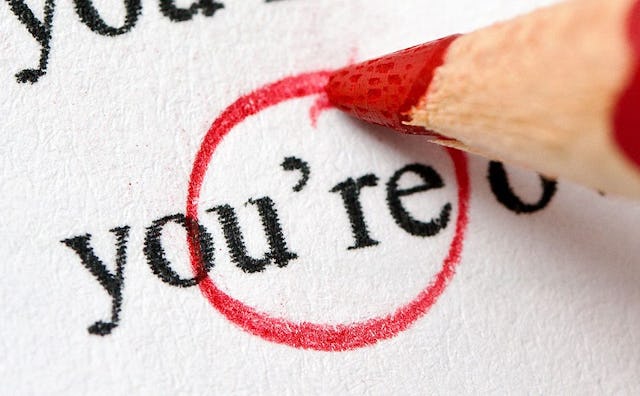Are You Really A Grammar Nerd?

Calling yourself a grammar nerd these days is a smug badge of honor. It’s a way of telegraphing to the world that you care about the little things, that you’re cultured, that in an age of always-on group texts and people filming the Fourth of July fireworks on their phones as if they will actually re-watch them, you still take the time for careful, well-punctuated communication.
The fact is, however, that I’m not a real grammar nerd. I, like you, have certain grammar bugaboos, those errors in written or spoken English that make my hair stand on end, that make me so uncomfortable that I want to correct total strangers or take a red Sharpie to a highway sign. But if I’m truly honest with myself, there are probably five to seven mistakes that I actually recognize in the course of my daily life, and the rest totally pass me by. I blame this on a huge gap in my public school education. While I can still reel off the names of the Inuit family we studied in fifth grade and belt out all the words to “Top of the World” by the Carpenters (ah, hippie music teachers), I can’t recall learning what a dependent clause is or the difference between “lie” and “lay.” (NB: I do work as an editor, so when it comes to the written word, I think I can lay claim to the “nerd” designation, but as far as policing people’s grammar in everyday life, I’m basically asleep at the wheel.)
I’m always interested in what gets other people’s grammar antennae vibrating. I have been known to have a minor seizure when a friend says, “Me and him went to the beach” and to contemplate scalping people who use “myself” when “me” is correct because they think it sounds more formal (e.g., “If you have any questions, you may ask Jim or myself”). But while I have friends who sing that Joan Osborne song as “What if God were one of us,” that kind of colloquial error doesn’t bother me so much. We’re all grammar cops, but what qualifies as a crime varies from one enforcer to another.
© Grammarly
Therefore, I was fascinated by this little chart above that breaks down “The Anatomy of the Grammar Nerd.” Evidently, we’re mostly women, and we’re mostly in Chicago and New York. However, I dispute their assertion that grammar nerds love the Oxford comma—even calling it the Oxford comma seems unnecessarily douchey. It’s called the serial comma, people, and it’s as outdated as putting two spaces after a period.
I will happily debate with people what makes a real grammar nerd. I’ll start the argument by asserting that observing the following elementary rules does not make you a nerd—it makes you a fluent speaker of English and nothing more.
– Not saying “irregardless”
– Knowing the difference between “their,” “there” and “they’re”
– And the difference between “your” and “you’re”
– Knowing the “i before e” rule doesn’t apply to “weird”
Maybe what makes me a real grammar nerd is the fact that I even care about the distinction at all, that I’m wondering which of my friends know the difference between “which” and “that” and if it’s okay to end a spoken sentence with a preposition, as in “What’s it all about?” Maybe most people don’t even care and are just busy living their lives, too busy tending to the things that matter to actually care if I make a minor slip-up. I’d like to care less.
In the meantime, I remind readers that this article has been edited by a copy editor, so any grammatical errors herein are definitely not my fault.
This article was originally published on